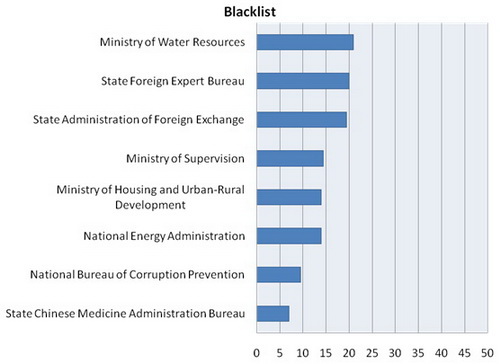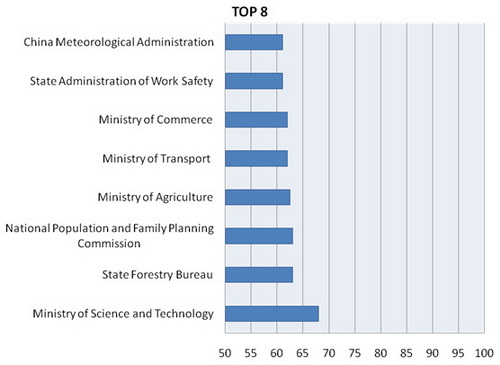

The Chinese Academy of Social Science Writing and Press released a survey yesterday called “Rule of blue: China law development report of 2011."
The academy surveyed 1300 officers, and 1350 citizens about government transparency in China. 1137 of the 1300 of officers, and 1138 of the 1350 citizens surveyed were deemed valid. This survey looked at more than ten different provinces including Beijing, Shanghai and Tianjin.
The officers surveyed work in different administrative and unit levels.There were 14 in the provincial level, 226 in the bureau level, 471 in the sectional level, and 379 in the below sectional level.
The units in which they worked also varied.248 worked in provincial work units, 208 in bureau level units, 301 in country level units, and 329 in sectional level units.
The citizens surveyed come from various backgrounds as well in terms of their educational and employment status.
Of those surveyed, 81.4% of citizens think that all departments should publish their information, and that it should be accessible to the public.
The survey also showed that many officers felt the same way:
70 percent of surveyed officers agreed that government information should be more transparent.
21.1 percent disagreed.
The survey showed that higher officials were more likely to agree with making government information more accessible to the public.
More than 80 percent of provincial and bureau level officers agreed that the government should be more transparent, however only 64.4 percent strongly advocated measures to do so.


Information Disclosure
The China Law Development Report for the second time issued a review of the transparency of China’s government. The overall report was not optimistic.
The survey investigated 59 departments, of which 43 departments released information for review. A full mark of 100 points equates to a transparent government. Only 8 departments received a satisfactory score.
According to the survey, the Ministry of Science and Technology received the highest score, with 68 points. The Chinese Medicine Administration received the lowest with just 7 points.
Poor access to government information includes various factors such as slow loading websites, unstable URLs, and prohibited sites. For example the website for the Ministry of Housing and Urban- Rural Development was under construction for 2 months last year, and was not open to visitors.
Another issue for e-government websites is wasteful spending. The research group found out that Datong, Guangzhou, and Changchun were all running two websites with similar information at the same time.
Complaints around access and government transparency include:
1. Too hard to get information
Before users can get access to information from government websites, they have to first register and provide general information. Applicants have to a have a printer, scanner, and digital camera to fulfill the requirements necessary to apply. This deters many applicants from receiving information. 2. Too much information needed from applicant
Most websites ask applicants to supply information such as their work units, ID card, number, gender, and age. Every applicant also has to clarify his or her intent. There are even more requirements now then compared to just two years ago.
3. Information is not useful
When asked questions, many departments were not accountable and did not respond in a timely manner. For those who provided answers, many failed to get to the root of the question, and often diverted from the actual question.
Links and Sources
The Beijing News: 七成公职人员支持财产公开 (Chinese)

